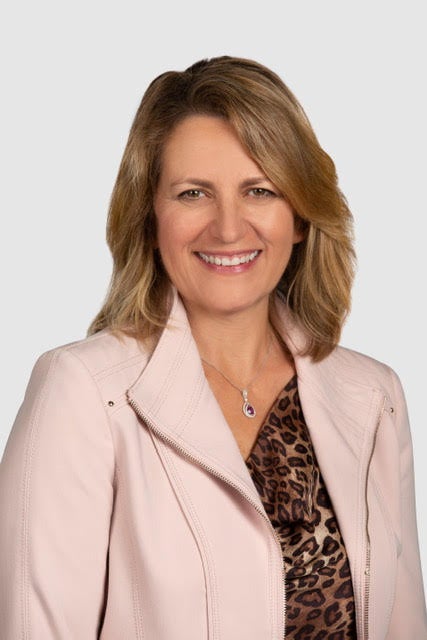
Shanti Ariker
SENIOR VICE PRESIDENT,
GENERAL COUNSEL, AND
CHIEF OF STAFF
SALESFORCE.ORG
Back in 2000, the idea of accessing large amounts of data through a browser was revolutionary. Shanti Ariker was a young lawyer and Salesforce’s Chairman and CEO Marc Benioff was promoting his new company. She attended an event to learn more about the technology. Founded just a year earlier, in 1999, Salesforce empowered companies to connect with their customers in a whole new way. Salesforce’s customer relationship management system is based on the cloud, allowing companies to access data from anywhere there is an internet connection. The idea, somewhat quaint now, hooked Ariker and she monitored job postings while working as a litigation lawyer, and later as a contract manager where she also managed intellectual property portfolios and patent programs.
Years later she still kept an eye on Salesforce and was elated when she saw an in-house position available. She started in Salesforce’s Toronto office. A decade after she first heard of the company, she was still explaining the concept of cloud computing at legal conferences. She moved to San Francisco and became familiar with Salesforce.org, the philanthropic arm of the company. One of Benioff’s credos is to pledge one percent of the company’s product, employee time, and resources to help make the world a better place. All employees of Salesforce get seven days a year to volunteer at their favorite charities and the company matches donations up to US$5,000.
After becoming familiar with the organization, Ariker was asked to join as general counsel. “I jumped at the chance to work at a technology company that was also a nonprofit, where I could do tech law and learn about the granting process, issues related to nonprofits, and charity law issues as well,” she remembers. Salesforce.org offers end-to-end solutions for nonprofits. It connects them with partners, supporters, employees, and programs.
As senior vice president, general counsel, and chief of staff of Salesforce.org, she works closely with CEO Rob Acker to understand business priorities, provide counsel, and help connect the dots between other leaders and customers, Ariker says. She’s been in the position for three years and revenue has gone up every year. In fact, she says, revenue has increased 10 times over what they were four years ago. “My goal is to not just keep up with the needs of the business but to try to anticipate where the business is going and get ahead of any changes by hiring the right roles in the legal department,” she explains. She decided to take on the chief of staff role after the CEO urged her to do so. She says she’s surprised more general counsel aren’t adding that position to their resumes because it is one of the best ways to know the business.
Ariker is also responsible for communications with the board of directors as company secretary. The board is composed of notable figures such as Ron Conway, who has often been described as a Silicon Valley “super angel” for his early investments in technology companies like Google and PayPal. Ariker stresses the importance of finding out how each board member likes to communicate. One of her achievements since joining Salesforce.org is to organize board communications through a portal to reduce emails to only what is necessary.
Ariker was also successful in establishing a pro bono program. She approached Salesforce’s President of Legal and General Counsel Amy Weaver about starting a program. “She was a huge advocate from the start and we wouldn’t have reached 1,000 hours that we gave back in pro bono legal hours without her support,” Ariker exclaims. One of her favorite organizations to work with is Glide Memorial in San Francisco. The organization provides over 800,000 meals to disenfranchised San Franciscans a year. Many Salesforce employees volunteer there on a regular basis. The legal team even started a monthly clinic. “Now, when people come in to get a meal and other services at Glide, they can also come and see a lawyer during our clinic hours and talk about any legal concerns they are having,” Ariker shares. She recommends using the Pro Bono Institute, an ACC affiliate, to help set up a program at both local and national levels.
Ariker enjoys working in San Francisco. After all, it’s home for her. She grew up in Northern California, the daughter of a physicist and nurse practitioner. Her first experience with the legal system was during her parents divorce. “I learned about how the system worked, and I was fascinated by the role the lawyer had in all of it,” she recalls. “Sometimes inspiration can come from unlikely situations.”
She moved to Israel after high school and joined the Israeli Defense Forces, as it’s typical for Israelis to join the army before university. She then returned to the United States for law school at UVA in Charlottesville. She learned a lot about leadership during her time there. “Commanders were tough and had to remove emotion and empathy from their leadership style, which was a necessity in that environment,” she remembers. That approach doesn’t work in business, she acknowledges. In fact, she says, she takes the exact opposite approach. “I try to get to know my team and understand how they feel, not just talk about work. I want us to feel like a family — what we call Ohana [a Hawaiian term that means extended sense of the family] — and to be able to share with each other if we want to and enjoy our work together. We all spend so much time at work, if it isn’t something you look forward to, why do it?”
Like most lawyers, her first positions were at firms. She says firms are a great way to hone skills and learn the basics of law. Salesforce expects its lawyers to come in with a good deal of knowledge and Ariker believes that getting the same type of mentorship in-house would be difficult. For a lawyer considering a move in-house, she suggests researching different companies and industries. Working for a biotech company will be different from working in for a technology or retail company. Alumni and bar associations are great resources, she notes.
But, she acknowledges, a lot has changed since she first joined the legal profession. As someone who works in the technology field and the legal world, she’s aware that there’s a perception that both are male dominated. She recalls, “as a junior associate, a few times I was asked when the lawyer would be arriving — they thought I was the paralegal!” It’s been years since she’s experienced anything like that and she’s confident that equality will come with time. “At Salesforce.org in particular,” she says, “we’ve partnered with San Francisco and Oakland Unified School Districts to improve access to computer science education. We believe equality starts with education.” Through Salesforce.org, her goal is to help nonprofits maximize their potential to help the world.
Getting to know…Shanti Ariker
WHAT’S YOUR IDEAL VACATION?
Something that combines activity and learning about a local culture, not just relaxing by the beach.
WHAT ARE YOU READING RIGHT NOW?
Two books: Seveneves, a Sci Fi novel about a time when the moon has broken into seven pieces and everyone believes that the Earth will imminently be destroyed by those fragments; and Yiddish for Pirates, a Canadian novel, which was shortlisted for the Giller Prize, a prestigious Canadian literary award, that I picked up in Toronto this summer.
IF YOU COULD CHANGE CAREERS, WHAT WOULD YOU DO?
I’d be in software sales. I love the passion that salespeople have for the software they sell and they work towards accomplishing their goals, which are concrete, but also need to know enough about the solutions to be able to add value to their customers.
WHAT IS SOMETHING YOU LEARNED IN LAW SCHOOL THAT YOU STILL USE EVERY DAY?
The Socratic method teaches you to ask questions to get to the root of an issue, and that’s really a good way to understand an issue rather than coming in thinking you have all the answers. It helps to ensure you have considered all the data and other opinions as well.
WHAT IS YOUR FAVORITE FOOD?
I love all kinds of pasta, which is so taboo these days. I try to enjoy it anyway once in awhile.




